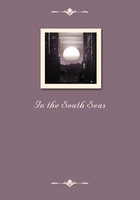
第101章 THE KING OF APEMAMA:THE PALACE OF MANY WOMENTHE(3)
Suppose we had business with his majesty by day:we strolled over the sand and by the dwarfish palms,exchanged a 'KONAMAORI'with the crone on duty,and entered the compound.The wide sheet of coral glared before us deserted;all having stowed themselves in dark canvas from the excess of room.I have gone to and fro in that labyrinth of a place,seeking the king;and the only breathing creature I could find was when I peered under the eaves of a maniap',and saw the brawny body of one of the wives stretched on the floor,a naked Amazon plunged in noiseless slumber.If it were still the hour of the 'morning papers'the quest would be more easy,the half-dozen obsequious,sly dogs squatting on the ground outside a house,crammed as far as possible in its narrow shadow,and turning to the king a row of leering faces.Tembinok'would be within,the flaps of the cabin raised,the trade blowing through,hearing their report.Like journalists nearer home,when the day's news were scanty,these would make the more of it in words;and Ihave known one to fill up a barren morning with an imaginary conversation of two dogs.Sometimes the king deigns to laugh,sometimes to question or jest with them,his voice sounding shrilly from the cabin.By his side he may have the heir-apparent,Paul,his nephew and adopted son,six years old,stark naked,and a model of young human beauty.And there will always be the favourite and perhaps two other wives awake;four more lying supine under mats and whelmed in slumber.Or perhaps we came later,fell on a more private hour,and found Tembinok'retired in the house with the favourite,an earthenware spittoon,a leaden inkpot,and a commercial ledger.In the last,lying on his belly,he writes from day to day the uneventful history of his reign;and when thus employed he betrayed a touch of fretfulness on interruption with which I was well able to sympathise.The royal annalist once read me a page or so,translating as he went;but the passage being genealogical,and the author boggling extremely in his version,Iown I have been sometimes better entertained.Nor does he confine himself to prose,but touches the lyre,too,in his leisure moments,and passes for the chief bard of his kingdom,as he is its sole public character,leading architect,and only merchant.
His competence,however,does not reach to music;and his verses,when they are ready,are taught to a professional musician,who sets them and instructs the chorus.Asked what his songs were about,Tembinok'replied,'Sweethearts and trees and the sea.Not all the same true,all the same lie.'For a condensed view of lyrical poetry (except that he seems to have forgot the stars and flowers)this would be hard to mend.These multifarious occupations bespeak (in a native and an absolute prince)unusual activity of mind.
The palace court at noon is a spot to be remembered with awe,the visitor scrambling there,on the loose stones,through a splendid nightmare of light and heat;but the sweep of the wind delivers it from flies and mosquitoes;and with the set of sun it became heavenly.I remember it best on moonless nights.The air was like a bath of milk.Countless shining stars were over-head,the lagoon paved with them.Herds of wives squatted by companies on the gravel,softly chatting.Tembinok'would doff his jacket,and sit bare and silent,perhaps meditating songs;the favourite usually by him,silent also.Meanwhile in the midst of the court,the palace lanterns were being lit and marshalled in rank upon the ground -six or eight square yards of them;a sight that gave one strange ideas of the number of 'my pamily':such a sight as may be seen about dusk in a corner of some great terminus at home.Presently these fared off into all corners of the precinct,lighting the last labours of the day,lighting one after another to their rest that prodigious company of women.A few lingered in the middle of the court for the card-party,and saw the honours shuffled and dealt,and Tembinok'deliberating between his two;hands,and the queens losing their tobacco.Then these also were scattered and extinguished;and their place was taken by a great bonfire,the night-light of the palace.When this was no more,smaller fires burned likewise at the gates.These were tended by the crones,unseen,unsleeping -not always unheard.Should any approach in the dark hours,a guarded alert made the circuit of the palisade;each sentry signalled her neighbour with a stone;the rattle of falling pebbles passed and died away;and the wardens of Tembinok'crouched in their places silent as before.